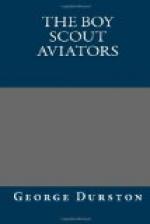“Yes, if I sit up until my next turn of duty,” said Burridge, with a smile. “Good luck, Fleming.”
Then Harry was off again. Dawn was very near now. The east, behind him, was already lighted up with streaks of glowing crimson. Dark clouds were massed there, and there was a feeling in the air that carried a foreboding of rain, strengthening the threat of the red sky. Harry was not sorry for that. There would be work at Bray Park that might well fare better were it done under leaden skies.
As he rode he puzzled long and hard over what he had learned. It seemed to him that these German spies were taking desperate chances for what promised to be, at best, a small reward. What information concerning the British plans could they get that would be worth all they were risking? The wireless at Bray Park, the central station near Willesden, whence the reports were heliographed — it was an amazingly complete chain. And Harry knew enough of modern warfare to feel that the information could be important only to an enemy within striking distance.
That was the point. It might be interesting to the Gennan staff to know the locations of British troops in England, and, more especially, their destinations if they were going abroad as part of an expeditionary force to France or Belgium. But the information would not be vital, it didn’t seem to Harry that it was worth all the risk implied. But if, on the other hand, there was some plan for a German invasion of England, then he would have no difficulty in understanding it. Then knowledge of where to strike, of what points were guarded and what were not, would be invaluable.
“But what a juggins I am!” he said. “They can’t invade England, even if they could spare the troops. Not while the British fleet controls the sea. They’d have to fly over.”
And with that half laughing expression he got the clue he was looking for. Fly over! Why not? Flight was no longer a theory, a possibility of the future. It war, something definite, that had arrived. Even as he thought of the possibility he looked up and saw, not more than a mile away, two monoplanes of a well-known English army type flying low.
“I never thought of that!” he said to himself.
And now that the idea had come to him, he began to work out all sorts of possibilities. He thought of a hundred different things that might happen. He could see, all at once, the usefulness Bray Park might have. Why, the place was like a volcano! It might erupt at any minute, spreading ruin and destruction in all directions. It was a hostile fortress, set down in the midst of a country that, even though it was at war, could not believe that war might come borne to it.




